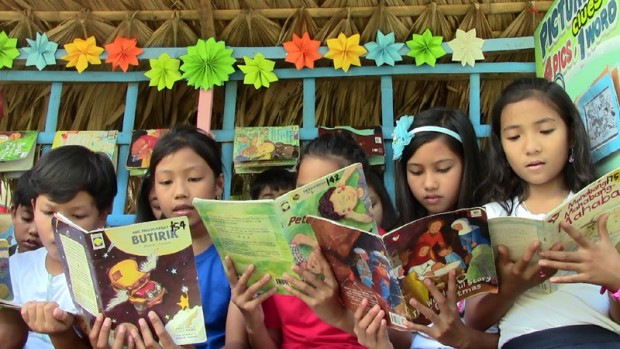In Sorsogon village, entire community raises readers

READING SPACES With reading nooks designated in several sections of San Jose Elementary School in a remote village in Donsol, Sorsogon province, students find comfortable space to enjoy reading. Since the school library cannot accommodate all students, parents and teachers have put up a reading garden on the campus. MICHAEL B. JAUCIAN / INQUIRER SOUTHERN LUZON
DONSOL, Sorsogon—Children her age usually spend their leisure time playing outdoors or staying glued to their computers, but 10-year-old Angel Mae Moraga and other pupils at San Jose Elementary School in Donsol town in Sorsogon province are reading books instead.
Moraga, who is in Grade 5 and leads a reading program in her school, is among the students who took to reading after Barangay San Jose, a remote village about 20 kilometers from the town center, embraced the project to improve its children’s skills.
Reading corners have been put up in households in the remote barangay to encourage children to read. The school has also set up a reading garden to give students an alternative area to read.
Without these dedicated spaces, Moraga said she and her classmates would have ended up as slow readers and learners.
Guia Mae Timola, 13, a Grade 6 pupil, described her journey in learning how to read as “fun, exciting and educational.”
Article continues after this advertisement“I always wanted to be in school because I did not want to miss these reading sessions,” she said. “We used to spend our idle time playing traditional Filipino games.”
Article continues after this advertisementReading helped improve her vocabulary, which eventually resulted in high grades in spelling quizzes, Timola said.
Adrian Marchan, 10, walks for an hour and endures a 10-minute river crossing to get to school, but he says attending classes everyday was worth the travel.
The 200 books that the school had acquired through donations had already been read by students, said librarian Maria Maricel Padilla-Homan. “Soon, the books would be memorized by students,” she said.
Most of the students borrow books and bring them home every day.
Reading garden
Since the library could not accommodate all students, officials of the Parents-Teachers
Association (PTA) decided to put up a reading garden on the campus. With funds pooled from parents, the PTA was able to build nipa huts that students can use, said the group’s president, Ester Serrano.
They also put up reading corners in their homes and decorated these with posters showing action words and popular quotations to inspire the children to read.
Ryan Homan, acting head of San Jose Elementary School, said the program was aimed at raising and nurturing readers.
Reading proficiency up
“The reading proficiency level of my pupils improved after we started the program in August 2015. In fact, out of 102 students, only one could be considered a slow reader,” he said.
Ryan Homan said the school also devised a unique way to entice children to learn by holding reading sessions on the river, aboard a raft (locally called balsa), and in the midst of nature.
“The ‘balsa basa’ is a remedial class offered by the school for slow learners. It is also open for out-of-school youth who would like to learn how to read,” Homan said.
Baroso said San Jose Elementary School led 45 schools in the Bicol region in the Philippine Informal Reading Inventory, a system that the Department of Education used to assess the reading proficiency levels of students.
A Grade 1 pupil, described by school administrators as the only “slow learner” here, has been showing signs of improvement in reading and learning, the child’s teacher, Maricris Llaguno, said.
“[The boy’s] attitude toward reading had changed a lot. In fact, when I focused my attention on him, I saw that he enjoyed reading and counting. He was no longer the shy, timid kid in school,” she said.
His parents, Llaguno said, bought him four pamphlets in reading, writing and counting, both in English and Filipino, when she informed them of the boy’s participation in class recitation and other activities.
Volunteers
The community’s mothers have also pitched in, serving as volunteer teachers. They call themselves “Teacher Nanay” volunteers and hold reading sessions for an hour a day—30 minutes in the morning and another half hour in the afternoon, Serrano said.
“We are doing volunteer work because we value the future of our children,” she said.
This is also a way of lessening the academic load of the four teachers of the school.
To sustain the students’ love for reading, San Jose Elementary School has been appealing for book donations.
Maria Cristina Baroso, project coordinator of Educo Philippines, a nongovernment organization that provides reading materials to the school, said the program succeeded due to the participation and involvement of every community member.
“With the cooperation of everyone, it is indeed not impossible to educate a child in every village,” she said.